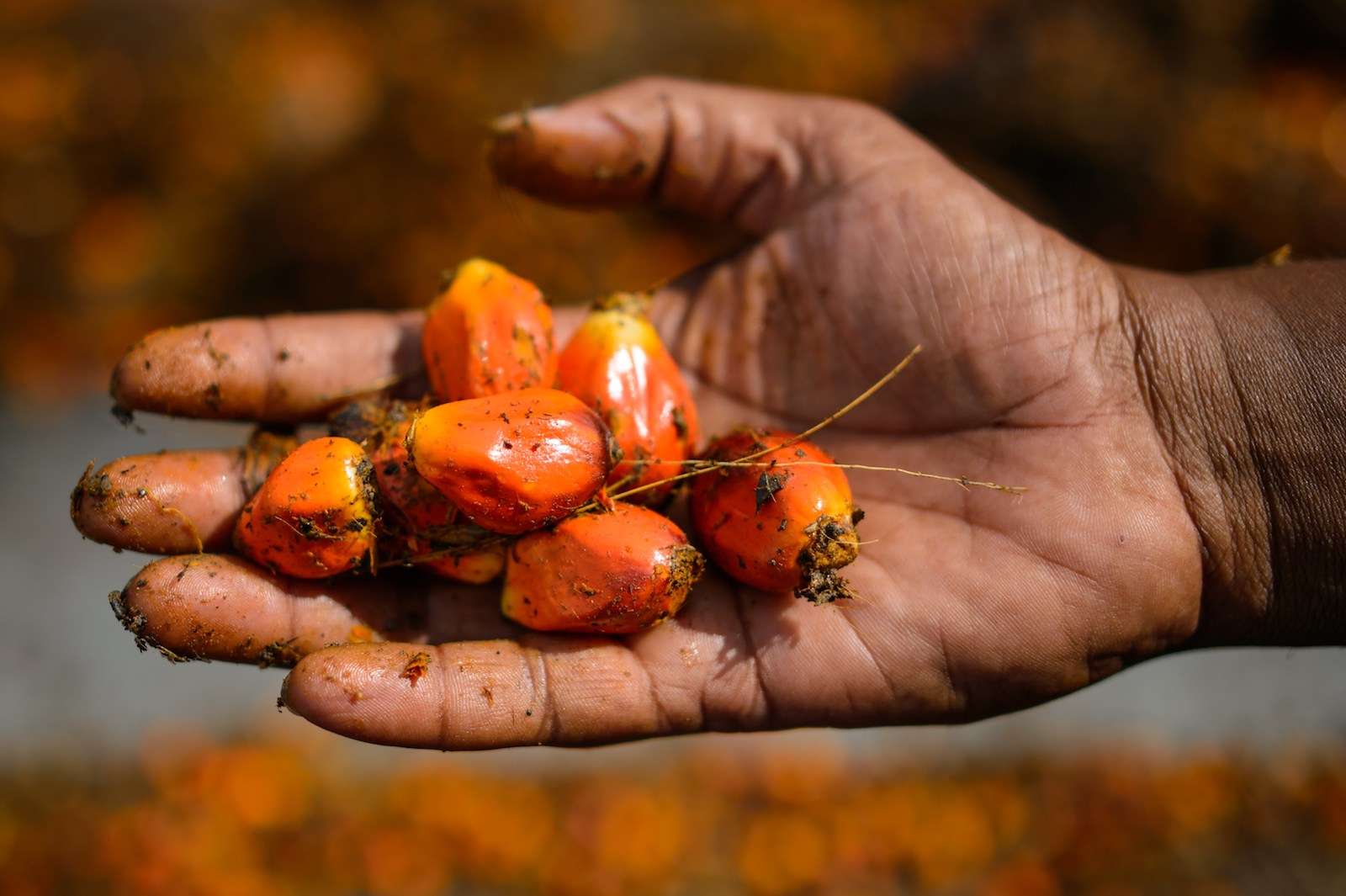Can Asia Make Sustainable Palm Oil?

A worker shows palm oil fruits at a factory in Sepang, outside Kuala Lumpur. Tropical forests continue to tumble at a rapid rate to make way for fast-expanding palm oil cultivation, despite a decade-old industry drive to encourage sustainable cultivation.
Photo: Mohd Rasfan/AFP/Getty Images
This is the fourth article in a weeklong series on sustainability-related issues in Asia. Read the previous pieces in the series here, here, and here.
Palm oil is the most widely consumed, yet one of the most contentious, vegetable oils on the planet. This high-yielding and versatile food commodity pervades half the items on our supermarket shelves, but not without a cost: deforestation and degradation of critical ecosystems, climate change, and abuses of labor and human rights.
As demand continues to grow amidst rising affluence, and with the agriculture and forestry, and land use sector already contributing to 24 percent of the world’s greenhouse gas emissions, how we use land for food must become a critical part of the climate solution rather than the problem.
Not Enough Progress
Current solutions to transform the way we use land for food, and palm oil in particular—despite seeing significant progress—will remain ineffective as long as Asian companies and banks continue to buy and finance unsustainable palm oil.
Parts of the market are forging ahead. Many of the sector’s large brands have sustainable sourcing policies in place, albeit varying in strength. These at least require certification to the most widely adopted certification standard, the Roundtable on Sustainable Palm Oil (RSPO), which is being revised to account for its shortcomings, or go further to include No Deforestation, No Peat, and No Exploitation (NDPE). Many international banks, too, go beyond RSPO to include NDPE commitments, and investors representing $6.7 trillion have called for the RSPO revisions to catch up to these leading market practices. Financial institutions representing over $81.7 trillion are also backing Task Force on Climate-Related Financial Disclosures (TCFD), which calls for the disclosure of forward-looking and science-based climate strategies and has recommendations for the food and beverages sector. Some banks are already rewarding more sustainable companies with loans that tie the cost of capital to ESG ratings—including companies in food supply chains.
While these developments are not without their challenges—for example, how to monitor and enforce NDPE commitments—the arguably bigger threat to the sector is continued leakage of unsustainable palm oil into a secondary market with slacker requirements.
Addressing Challenges
There are at least three reasons behind this, which must be addressed if we want to transform the palm oil sector into a sustainable development success story.
First is the tendency of companies to “clean up” supply chains by buying from already sustainable suppliers. Rather than solving the problem, this merely displaces deforestation to surrounding landscapes and will persist as long as smallholders are excluded from more progressive companies’ programs. Given limited resources, technical capacity, or incentives, smallholders will continue to grow through expansion—often on land that is critical to ecosystems and climate health—rather than through efficiency gains.
Second, the market will pick up what the pristine supply chains do not want. India is now the world’s largest importer of palm oil, while growing demand from emerging markets for palm oil is a key driver of deforestation in Indonesia and Malaysia. In fact, the major growth markets for palm oil are exactly those markets with softer sustainability standards—not only in China and India, but also the Middle East and Eastern Europe.
According to Thomson Reuters, only a quarter of Asian-headquartered companies disclose emissions reduction targets.
Third, Asian banks continue to lend to those sourcing or producing unsustainable palm oil without requiring time-bound improvements on sustainability criteria as conditions for lending.
A new report titled Keep Palm by WWF and CLSA, an Asian capital markets and investment group, outlines how companies, banks and investors can play a role in lifting the entire industry’s sustainability standards.
The report recommends that end buyers—the regions’ retailers, consumer goods companies, restaurants, and hotels should commit to and disclose progress against time-bound plans for sourcing RSPO-certified and NDPE-compliant palm oil and to achieving 100 percent traceable (to the plantation) supply chains.
This “clean up,” however, should not merely displace the sector’s problems. At least a portion of procurement for sustainable supply chains should come from smallholders, preferably by helping smallholders to achieve RSPO certification. At the same time, the focus needs to go beyond individual plantations and projects to ensure the sustainability of wider landscapes and the communities that depend on them, finding multistakeholder solutions that simultaneously protect vital ecosystems and forests and uplift local communities.
The Role of Banks
The region’s financiers play a critical role in supporting these solutions. Banks can start by disclosing how issues of climate, deforestation, labor, and human rights are managed in their lending portfolios; they can follow their international peers in requiring sustainable production practices by clients; and they can help smallholders improve their practices through innovative funding mechanisms. Investors, too, can continue to engage with portfolio companies across supply chains and sectors, including the banks financing them, to push for more ambitious adoption of best practices and more transparency around business practices.
According to data from Thomson Reuters, only a quarter of Asian-headquartered companies disclose emissions reduction targets. “Transparency is key to the solution,” according to Elena Philipova, head of ESG Proposition at Thomson Reuters, as public reporting and commitments enforce accountability—and this is true for small and large corporations, investors and the public sector. The data shows that companies that disclose emissions reduction targets have a significantly higher ESG rating on average than companies that do not, and these ratings are starting to impact the cost of capital.
Home-grown initiatives such as the Singapore-based Southeast Asia Alliance for Sustainable Palm Oil and the China Sustainable Palm Oil Alliance indicate an emerging commitment to sustainable palm oil in the region. Facilitating collaboration between multinational brands, small- and medium-sized enterprises and civil society, these initiatives highlight the potential for multistakeholder solutions to drive the industry forward.
By building on this momentum and leveraging the impact of the region’s banks and investors, the sector’s stakeholders can go a long way in helping palm oil reach its potential to contribute to, rather than undermine, sustainable development. Palm oil can be and must be a critical part of the solution to food security, regional sustainable development and the global climate crisis.
*A version of this piece was first published on Thomson Reuters.







